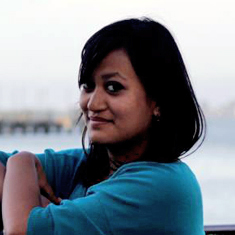The Poetry of Yukta Bajracharya : Love, Family & Relationships
For the last decade, a poetess in Yukta Bajracharya has been growing up. A fresh new name making a quiet entry into the contemporary poetry scene, she has more often chosen to write in English but has been not less effective as a trilingual (English, Khas Nepali & Nepalbhasha) too.
It would be a daunting task for anyone to collectively speak about her breadth of work but to discuss their common qualities is, surprisingly, interesting. With a high dose of individualistic expressions, mostly lost in the memories of her childhood and various relationships, sometimes in the imaginations of herself deeply expressed with the uncanny details of relived realism, she is a romantic storyteller to the core when it comes to writing.
A huge chunk of her work is what serves as a summary of a girl’s unexpressed agony in a society like ours. At times, it can be seen as a mere representative of the working class, - in many of her works, the protagonist is walking along the streets, or doing daily chores. On the other hand, it beautifully portrays an on-going struggle with the fear of loneliness within the hustle and bustle of modern city life– something our generation identifies more easily with, whether we like it or not.
Like most educated girls of our generation, and as if it is mandatory, feminism shines in her expressions too and there is nothing wrong about it. But what is interesting when she unfolds her ideas, is that it does not come across as harsh and unforgiving as it is associated with in general.
“I hate how you
do not answer my calls
especially on nights when my brain
is a bullet train that only stops
every time at Paranoia.”
(from “10 Things I hate about you”, 2016)
A woman may hate a man for all those hundred reasons but it is as universal a fact that they need each other and why should one feel belittled in accepting that? She bares her characters who hold the shirt of their loved ones, taking it our of a cupboard in lonely nights.
“Straighten yourself up
smell the shirt one more time
store it
in the bottom most compartment
of your closet,
close the doors.”
(from “How to forget someone who has forgotten you”, 2016)
And however ace a love-guru she tries to portray herself as, she makes sure you feel the pain right where it is intended to. Staying on top of the actions and events that are lifted straight from real life situations we have all gone through sometime or the other in our lives, she weaves the dreams she wants us to see, destroys them in front of our eyes and resurrects them occasionally. When she completes this very cycle, she perfects her idealism of love and relationships in her trademark rise-after-the-fall poetry, which generally makes it totally worth reading.
I remember a brief moment when I had asked her over a lunch that if she was to read one poem to me, which one would that be? Unaware of the fact that I pretty much read every single word she has ever written, she quickly browsed through an old mobile (which in an emergency, she borrowed from her best friend’s boyfriend or something like that) and starting reading “Seaweeds”.
“I stand in front of the only mirror left unbroken in my house
and slap my self hard.
No wonder I feel so ugly.
I want to hate my mother for what she just said
no, actually, I want to hug her tight and cry”
(from “Seaweed”, 2015)
Undoubtedly one of her best, one can easily see how well she had lived every word in this beautiful piece. Here, she talks about her second favourite topic, which is family. Her natural sympathy for the mothers, and the deep respect and youth conflicts with the fathers, and so on. Hers is a poetry deeply rooted in the social strata of traditional settings and contemporary conflicts.
A third topic she frequently likes revisiting is people we long for. For her it is more often her grandfather, “Bajya” - her eternal refuge; and the way she recalls his hugs, bedtime stories and love, is just heart-warming. Something most readers can easily relate with or else love to discover with her.
There are these and more to explore at Yukta’s official blog, which she has taglined “Mostly rants, sometimes poems” but maybe it is the other way round. Find out for yourself at doughnutsanddilemmas.blogspot.com.






